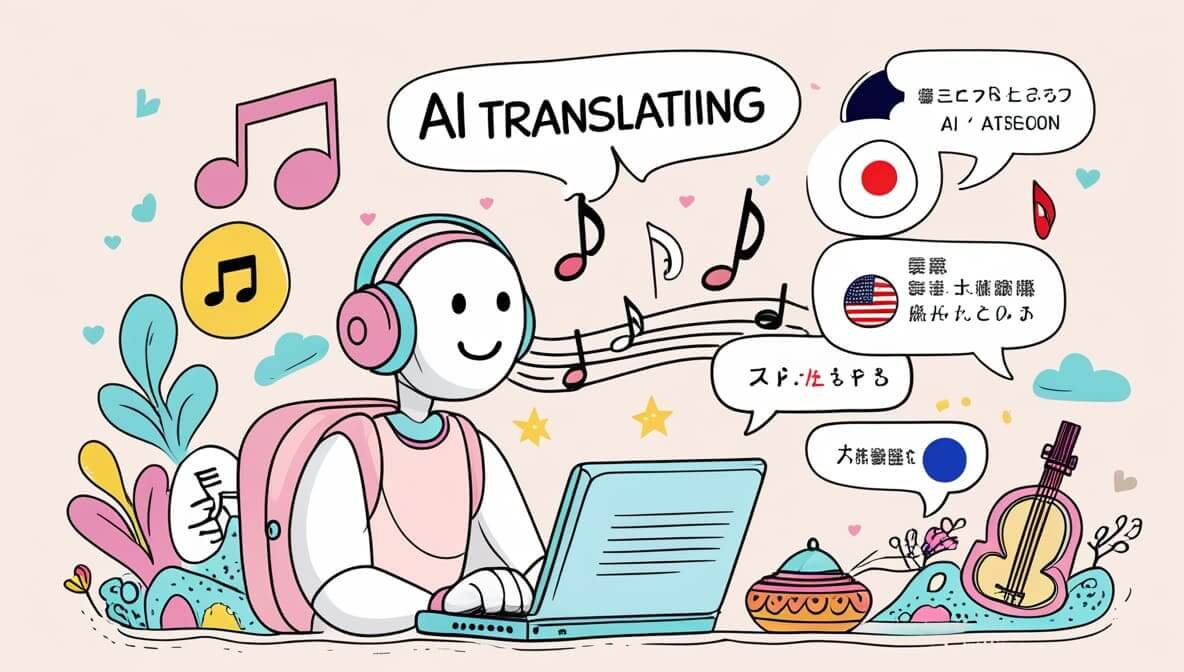In 1998, Céline Dion’s My Heart Will Go On became a global sensation, transcending language barriers and touching the hearts of millions. But what if this song had originally been sung in Mandarin, Spanish, or Arabic? Would it have carried the same emotional weight?
For decades, translated songs relied on human interpreters and adaptations—consider how Andy Lau’s Forget Love Water was transformed into a Japanese hit, or how Andrea Bocelli and Sarah Brightman’s Time to Say Goodbye became a multilingual classic.
Now, AI threatens to eliminate the need for human translation and adaptation altogether. With AI song translation, any song can exist in any language while retaining the original artist’s voice, melody, and emotional tone.
But is this the future of music, or a step towards the automation of artistry? If language barriers disappear, do songs gain universality or lose something irreplaceable?

In This Article
01 A Brief History of Song Translation
02 How AI Song Translation Works
03 The AI Song Translation Tools Leading the Market
04 Make Translated Lyrics Sing: Go Beyond Basic AI Song Translators with LitMusic
05 Ethical & Cultural Concerns: Are We Losing More Than We Gain?
06 The Future: Will AI Replace Song Translators or Artists?
01 A Brief History of Song Translation
Music has always been global, but language has often been an obstacle to its spread. Traditionally, multilingual music relied on human translation and adaptation, sometimes leading to cultural reinterpretations.
Famous Cases of Song Translation and Adaptation
- The Beatles’ German version of "I Want to Hold Your Hand" (Komm, Gib Mir Deine Hand)
The band was pressured to record a German version to appeal to the German-speaking market. However, adapting English lyrics to German resulted in an awkward translation that lost the song’s original energy. - Céline Dion’s "Pour Que Tu M’aimes Encore" vs. "Because You Loved Me"
The French version became a hit in francophone countries, while the English adaptation, though successful, had a different lyrical theme. - Disney’s "Let It Go" translated into 40+ languages
Instead of literal translations, Disney hired professional lyricists to create versions that preserved the song’s meaning, emotional weight, and melodic flow.
Translating music is not just about changing words—it’s about adapting a cultural experience. But now, AI aims to automate this process. Can it really succeed?
02 How AI Song Translation Works
AI song translation is far more complex than simply running lyrics through Google Translate. It involves three major steps:
STEP 1: AI-Powered Lyric Translation
AI uses Natural Language Processing (NLP) to translate lyrics while attempting to retain rhythm, syllable count, and meaning.
Challenge 1: Matching syllable structure
Example:
English: I will always love you (7 syllables)
French: Je t’aimerai toujours (7 syllables)
The AI must ensure that translated lyrics fit the melody without disrupting the song’s natural flow.
Challenge 2: Rhyme scheme adaptation
English relies on end rhymes (e.g., love and dove).
French prioritizes flowing rhyme structures, and tonal languages like Mandarin do not rely on rhyme at all.
AI must reconstruct lyrics in a way that maintains the poetic feel of the original.
STEP 2: AI Voice Cloning & Vocal Synthesis
AI uses deep learning models to analyze a singer’s vocal tone and inflections, then reconstructs their voice singing new lyrics in another language.
Example: Kits.ai can now generate AI versions of Taylor Swift singing in fluent Korean or Elvis Presley performing in Mandarin.
Challenge: Emotional authenticity
Current AI-generated vocals often lack the emotional subtleties of a real singer.
Challenge: Accent accuracy
AI struggles with languages that have complex phonetics.
STEP 3: AI Melody Adaptation
AI must restructure melodies to accommodate new lyrics without distorting the song’s original feel.
Example: Synthesizer V is currently the most advanced tool in adjusting melodies to match new linguistic structures.
AI doesn’t just translate lyrics—it restructures the very nature of a song. But does that make it better or just different?
03 The AI Song Translation Tools Leading the Market
If you're searching for a reliable AI song translator to streamline your music localization workflow, Music.AI is one of the most advanced tools on the market. With robust AI song translate capabilities, it lets users transcribe and translate lyrics or vocals from any audio file into over 80 languages—making global music access easier than ever.
Website:https://music.ai/modules/transcription/translation/
Music.AI offers powerful AI song translation features such as:
Pros
- Automatic Transcription & Alignment: Quickly convert any sung or spoken audio into text in seconds. It supports both word-level and syllable-level alignment, ensuring high accuracy for subtitling and lyric sheets.
- Multilingual Support: Easily translate music with AI into more than 80 languages, helping you create multilingual content for international audiences.
- Speaker Diarization: Distinguish between different vocalists or speakers in the same track—ideal for duets or spoken word content.
Cons
- Not Music-Creation-Focused: While Music.AI excels at transcription and translation, it does not offer music generation or composition tools.
- While some features might be accessible for free or in a trial, full access to its capabilities often requires a paid plan, especially for high-volume users.
Whether you’re a creator looking to translate songs with AI or a producer preparing content for global distribution, tools like Music.AI are transforming the way we connect music across languages.
04 Make Translated Lyrics Sing: Go Beyond Basic AI Song Translators with LitMusic
Most AI song translator tools today only focus on text—they translate lyrics but can’t actually sing or reproduce the music in the target language. These AI translate music tools fall short when it comes to emotional expression, vocal delivery, or even adapting a song’s genre or mood.
But what if your translated lyrics could be sung by AI and transformed into a completely new version—while still matching your musical vision?
LitMusic can generate full vocal performances based on translated lyrics, modify the instrumentation, genre, and mood, and even experiment with styles like pop, hip-hop, or acoustic ballads.
Whether you're localizing a song, experimenting with new ideas, or simply curious how your track sounds in another language, LitMusic turns your concept into a polished audio output—in minutes.
Now, enjoy this acoustic ballad version of Cruel Summer, beautifully reimagined by Lit Music.

05 Ethical & Cultural Concerns: Are We Losing More Than We Gain?
AI song translation presents three major controversies:
1) Cultural Homogenization: Is AI Making Music Generic?
- Example: Despacito in English
AI can make Despacito an English song, but does it erase the Latin identity of the track? - Example: La Vie en Rose in Japanese
Would it still carry the same emotional elegance, or would something be lost in translation?
2) Copyright Nightmares: Who Owns AI-Generated Songs?
- Drake & The Weeknd’s AI song incident (2023): AI-created music mimicking their voices went viral, but was later taken down due to copyright issues.
- If AI lets Michael Jackson “sing” in Mandarin, who owns it? Should AI-generated vocals be considered legal or artistic plagiarism?
3) Can AI Capture Human Emotion?
- AI can mimic tone and pitch, but it still lacks the improvisation and raw emotion that define great music.
If AI translates a song into 100 languages, is it making it more accessible or simply more robotic?
06 The Future: Will AI Replace Song Translators or Artists?
AI-driven music translation could shape the industry in three possible ways:
1. AI as a Tool for Artists
AI assists musicians in quickly translating songs, but human input is still needed to perfect the results.
2. AI Dominating the Music Industry
- AI-generated songs flood the market, making human artists redundant.
- The concern: Does AI kill creativity?
3. AI Redefining Global Music
- Could AI end English-language music dominance?
- More non-English songs might become global hits, disrupting the music industry’s current structure.
Are we entering a new golden age of global music—or an era of soulless AI automation?
06 FAQs About AI Song Translator
01 Is an AI song translator free to use?
Many AI song translator tools offer free basic features, allowing users to try AI song translate functions with limited access. However, for higher-quality AI song translation with better accuracy and vocal matching, some premium tools might require a subscription or a one-time payment.
02 Can an AI song translator sing the translated lyrics?
Most AI song translator tools only offer text-based translations. However, platforms like LitMusic allow users to generate sung versions of the translated lyrics using AI voices. This helps in adapting songs creatively across different languages while preserving musicality.
03 Are people really interested in translating songs into different languages?
Yes! There’s growing global interest in AI translate music solutions, especially for fans who want to enjoy international hits in their native language or artists who aim to reach wider audiences. AI song translation allows emotional meaning and lyrical style to cross language barriers more easily than ever before.
04 Is it legal to translate and publish a song?
Translating and publishing a song—whether manually or using an AI song translator—typically requires permission from the copyright owner. Even if the AI song translate process is automated, publishing or sharing the translated version commercially may infringe on copyright if done without proper licensing. Always check legal guidelines before distributing any translated content.
07 Conclusion
AI song translator tools are changing how we experience global music. These tools help fans and musicians quickly and affordably translate songs into different languages—breaking down language barriers in music sharing.
While AI translations may occasionally lack emotional nuance or melodic alignment, they offer a creative springboard to enjoy and explore songs across cultures. With tools like LitMusic , you can take it a step further:
Use AI not just to translate lyrics, but to re-sing, rearrange, and remix songs into new styles, genres, and moods.
LitMusic — Bring Your Translated Lyrics to Life with AI
Whether your goal is to ai translate music or simply reimagine a song in a different language and genre, LitMusic lets you transform plain translated text into expressive, full-bodied music.
- No music skills needed – Just input your preferences and let AI do the rest.
- Versatile & royalty-free – Perfect for videos, podcasts, ads, and more.
- Fast & easy – Create, preview, and download your tracks instantly.


















